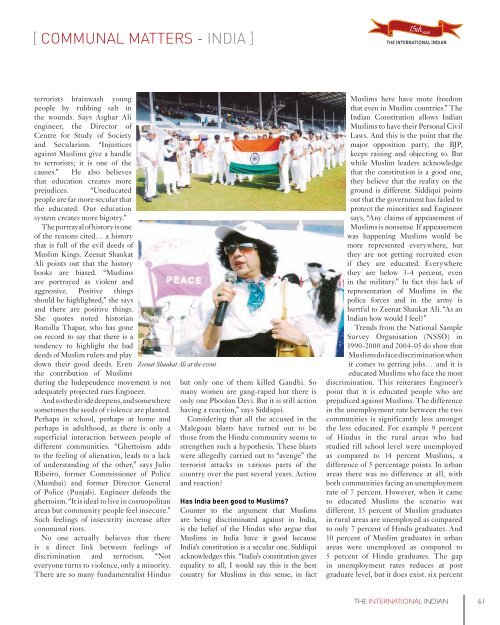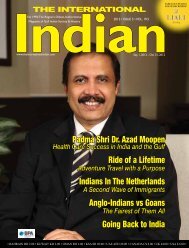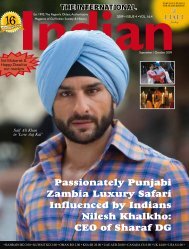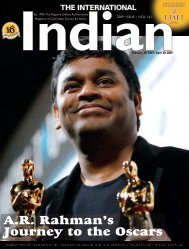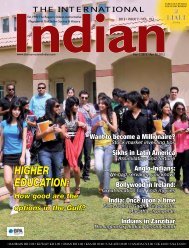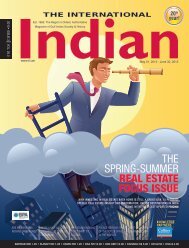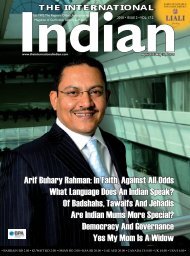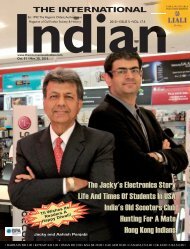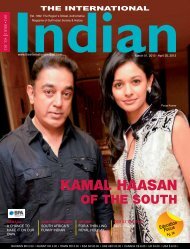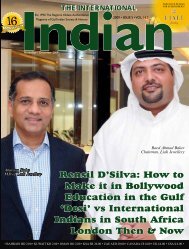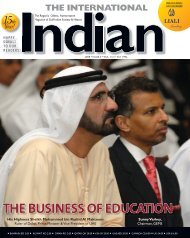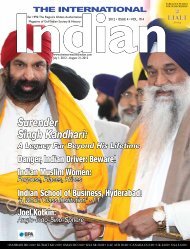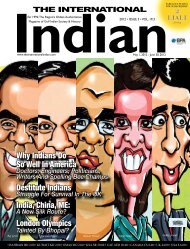THE INTERNATIONAL - International Indian
THE INTERNATIONAL - International Indian
THE INTERNATIONAL - International Indian
Create successful ePaper yourself
Turn your PDF publications into a flip-book with our unique Google optimized e-Paper software.
[ COMMUNAL MATTERS - INDIA ]<br />
terrorists brainwash young<br />
people by rubbing salt in<br />
the wounds. Says Asghar Ali<br />
engineer, the Director of<br />
Centre for Study of Society<br />
and Secularism. “Injustices<br />
against Muslims give a handle<br />
to terrorists; it is one of the<br />
causes.” He also believes<br />
that education creates more<br />
prejudices. “Uneducated<br />
people are far more secular that<br />
the educated. Our education<br />
system creates more bigotry.”<br />
The portrayal of history is one<br />
of the reasons cited… a history<br />
that is full of the evil deeds of<br />
Muslim Kings. Zeenat Shaukat<br />
Ali points out that the history<br />
books are biased. “Muslims<br />
are portrayed as violent and<br />
aggressive. Positive things<br />
should be highlighted,” she says<br />
and there are positive things.<br />
She quotes noted historian<br />
Romilla Thapar, who has gone<br />
on record to say that there is a<br />
tendency to highlight the bad<br />
deeds of Muslim rulers and play<br />
down their good deeds. Even<br />
the contribution of Muslims<br />
during the Independence movement is not<br />
adequately projected rues Engineer.<br />
And so the divide deepens, and somewhere<br />
sometimes the seeds of violence are planted.<br />
Perhaps in school, perhaps at home and<br />
perhaps in adulthood, as there is only a<br />
superficial interaction between people of<br />
different communities. “Ghettoism adds<br />
to the feeling of alienation, leads to a lack<br />
of understanding of the other,” says Julio<br />
Ribeiro, former Commissioner of Police<br />
(Mumbai) and former Director General<br />
of Police (Punjab). Engineer defends the<br />
ghettoism. “It is ideal to live in cosmopolitan<br />
areas but community people feel insecure.”<br />
Such feelings of insecurity increase after<br />
communal riots.<br />
No one actually believes that there<br />
is a direct link between feelings of<br />
discrimination and terrorism. “Not<br />
everyone turns to violence, only a minority.<br />
There are so many fundamentalist Hindus<br />
Zeenat Shaukat Ali at the event<br />
but only one of them killed Gandhi. So<br />
many women are gang-raped but there is<br />
only one Phoolan Devi. But it is still action<br />
having a reaction,” says Siddiqui.<br />
Considering that all the accused in the<br />
Malegoan blasts have turned out to be<br />
those from the Hindu community seems to<br />
strengthen such a hypothesis. These blasts<br />
were allegedly carried out to “avenge” the<br />
terrorist attacks in various parts of the<br />
country over the past several years. Action<br />
and reaction?<br />
Has India been good to Muslims?<br />
Counter to the argument that Muslims<br />
are being discriminated against in India,<br />
is the belief of the Hindus who argue that<br />
Muslims in India have it good because<br />
India’s constitution is a secular one. Siddiqui<br />
acknowledges this. “India’s constitution gives<br />
equality to all, I would say this is the best<br />
country for Muslims in this sense, in fact<br />
Muslims here have more freedom<br />
that even in Muslim countries.” The<br />
<strong>Indian</strong> Constitution allows <strong>Indian</strong><br />
Muslims to have their Personal Civil<br />
Laws. And this is the point that the<br />
major opposition party, the BJP,<br />
keeps raising and objecting to. But<br />
while Muslim leaders acknowledge<br />
that the constitution is a good one,<br />
they believe that the reality on the<br />
ground is different. Siddiqui points<br />
out that the government has failed to<br />
protect the minorities and Engineer<br />
says, “Any claims of appeasement of<br />
Muslims is nonsense. If appeasement<br />
was happening Muslims would be<br />
more represented everywhere, but<br />
they are not getting recruited even<br />
if they are educated. Everywhere<br />
they are below 3-4 percent, even<br />
in the military.” In fact this lack of<br />
representation of Muslims in the<br />
police forces and in the army is<br />
hurtful to Zeenat Shaukat Ali. “As an<br />
<strong>Indian</strong> how would I feel?”<br />
Trends from the National Sample<br />
Survey Organisation (NSSO) in<br />
1990-2000 and 2004-05 do show that<br />
Muslims do face discrimination when<br />
it comes to getting jobs… and it is<br />
educated Muslims who face the most<br />
discrimination. This reiterates Engineer’s<br />
point that it is educated people who are<br />
prejudiced against Muslims. The difference<br />
in the unemployment rate between the two<br />
communities is significantly less amongst<br />
the less educated. For example 9 percent<br />
of Hindus in the rural areas who had<br />
studied till school level were unemployed<br />
as compared to 14 percent Muslims, a<br />
difference of 5 percentage points. In urban<br />
areas there was no difference at all, with<br />
both communities facing an unemployment<br />
rate of 7 percent. However, when it came<br />
to educated Muslims the scenario was<br />
different. 15 percent of Muslim graduates<br />
in rural areas are unemployed as compared<br />
to only 7 percent of Hindu graduates. And<br />
10 percent of Muslim graduates in urban<br />
areas were unemployed as compared to<br />
5 percent of Hindu graduates. The gap<br />
in unemployment rates reduces at post<br />
graduate level, but it does exist. six percent<br />
<strong>THE</strong> <strong>INTERNATIONAL</strong> INDIAN 61


